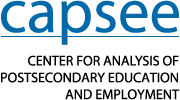Institutional Determinants of Labor Market Outcomes for Community College Students in North Carolina
By: Arne L. Kalleberg & Michael Dunn | August 2014
The extent to which community college students experience labor market success depends on both the attributes of the individual students and the characteristics of the community colleges they attend. In this paper, the authors examine the impact of community college characteristics on the earnings of first-time college students who enrolled in the North Carolina Community College System in 2002–03. They estimate multilevel models that incorporate variables representing institutional features of community colleges along with individual characteristics obtained from student-level administrative college transcripts data, Unemployment Insurance wage data, and enrollment and graduation data from the National Student Clearinghouse across 830,000 community college students between 2001 and 2010.
The authors find that a number of characteristics of community colleges enhance earnings independently of the attributes of individuals. In particular, students attending community colleges in service areas with higher unemployment rates receive lower earnings, and students from colleges that serve a single county and (especially women) in colleges with larger enrollments earn more.
A version of this paper appears in the Community College Review.
